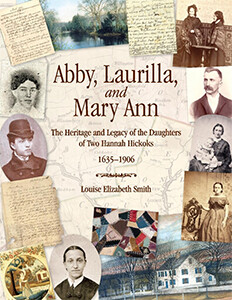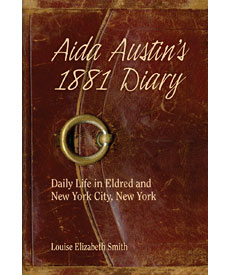
Aida Austin, Eldred,
to McKinley Austin, France
August 19, 1918
Dear McKinley,
We have been having a few cold days and it seems good after the terribly hot weather we had.
Your dad’s and Uncle Lon’s buckwheat looks fine. Uncle Lon gathered wheat last week. He has a yearling that he is going to put into beef this fall, so with our wheat and buckwheat, meat and vegetables, and fruit that I am putting up, our living won’t cost so very much…I am going to put up some plums and crab apples this week.
The only thing lacking is the chickens…I think you will find a fine flock of chickens on the place when you get back.
I see by the papers, the government is going to make some provision with regard to the education of the boys under 21 when the war is over. So perhaps you will be able to go through Cornell before you settle down as a farmer. I do hope you can, for it will mean so much to you later in life…
With love from all, Aunt Aida
I’m not sure how long it took Aida’s letter to arrive in France, but by the end of August there are some big changes underway that will affect McKinley and all the Austins.
St. Mihiel, France
On August 30, 1918, the first American Army under Gen. Pershing’s own command, took over the entire St. Mihiel Front with four Army Corps assembling the 1st, 4th, and 5th American and the 2nd French Colonial Corps.
On that day, Marshal Fock…proposed two new jobs for the American Army. The first was to be an attack between the Meuse and the Argonne Forest, on September 15th by the 2nd French Army supported by from 4 to 6 American Divisions.
At a meeting 3 days later, General Pershing insisted that the American Army be employed as a unit, and not piecemealed out…Pershing asked for the Muese-Argonne Sector. Fifty kilometers of the front from the Argonne to Port sur-Seille well to the east of St. Mihiel was placed under Pershing’s command together with all the French divisions then in that zone.—Gen. Liggett, from Saturday Evening Post, June 4, 1927.
Col. George S. Patton Jr.
General Pershing had earlier ordered the creation of a tank force to support A.E.F.’s infantry. In August 1918 Colonel George S. Patton Jr. (who was involved with training tank brigades) was placed in charge of the 1st Provisional Tank Brigade (later called 304th). Patton would command the French Renault tanks driven by Americans at the St. Mihiel Offensive.—From wikipedia.org.







